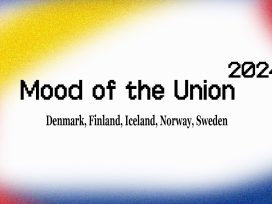The entry of the Sweden Democrats into the Swedish parliament after the elections of 19 September 2010 means that Europe’s last “bastion of tolerance” has fallen. When radical-right parties were making significant electoral gains elsewhere in the 1980s and 1990s, voters in the traditional liberal countries of northern Europe – such as Denmark, the Netherlands and Sweden – were resistant to their claims. Now the first two are among the most accommodating of intolerance: the Danish People’s Party of Pia Kjærsgaard has been a solid supporter of right-wing minority governments in Denmark since 2001, while the PVV (Party for Freedom) of Geert Wilders has begun playing a similar role in the Netherlands.
But is it really the case that the former “bastions of tolerance” have become as intolerant (or even more so) than other European countries; and, if so, why did it take them so long? Or is there something else at play?
A closer look at the results of research into European citizens’ attitudes suggests a more complex and interesting picture. Most such surveys show Denmark, the Netherlands and Sweden still to be among the most tolerant countries in Europe (and, by extension, the world). A Eurobarometer poll (admittedly conducted before the most recent right-wing advances, and indeed European Union enlargements) found that an average of 14 per cent of people across the EU were classified as intolerant – more than in the Netherlands (11 per cent) and Sweden (9 per cent), though in Denmark the figure was 20 per cent.
In addition these countries scored high on the index of those judged to be either “passively” or “actively” tolerant: against an EU average of 60 per cent, Sweden scored 76 per cent (just below the highest, Spain), and Denmark recorded 64 per cent. They also continue to be most in favour of gay rights and gender equality.
Against this, there is some evidence that Denmark and the Netherlands at least do stand out on the measure of negative attitudes towards Muslims (though regrettably, there are few relevant surveys which include any of the three countries under scrutiny). A Pew survey of May 2005 rated the Dutch as among the most anti-Muslim on some indicators; and both the European Commission against Racism and Intolerance (ECRI) and the European Monitoring Centre on Racism and Xenophobia (EUMC) have singled out the Netherlands (and to a lesser extent Denmark) for their Islamophobic political and public climate.
These (again, admittedly partial) findings indicate that the “former” bastions of tolerance in fact are still tolerant – just not toward Muslims. Moreover, in this particular intolerance toward a religious group they outdo generally less tolerant other European countries. Why?
A possible explanation, counterintuitive as it might seem, is that it is because of their overall social tolerance – rather than despite it – that these countries have become among the most openly Islamophobic.
The elements of change
The logic of the argument is threefold: relating to nationalism, conformism, and tolerance itself.
First, in all three countries tolerance was closely associated with a negative attitude toward ethnic nationalism and a self-perception of being that unique thing, a “non-nationalist nation”. In part because of the particular way the countries dealt with their experience of the second world war, nationalism was linked almost intrinsically with Nazism and the Holocaust. Hence, ethnic-national discourses (let alone racial ones) were suspect, and shunned by all but the ostracised extreme right. So, whereas radical-right parties in countries such as Austria, Belgium, or France could relate their anti-immigrant struggle to more broadly shared national narratives, this option was not available in Denmark, the Netherlands, or Sweden.
Second, most everyday citizens in these countries self-identified as tolerant, and would in any case self-censor where this was felt necessary; but in addition, their elite had a special weapon in its struggle to keep politics “politically correct” – conformity. After all, northern Europe is as well known for its conformity (which traditionally includes a high trust in state actors and institutions) as for its tolerance. The often genuinely pro-multicultural elites were able to keep the immigration issue off the agenda, because the most intolerant people were also the most conformist (this is shown in the case of the Netherlands by Paul Sniderman & Louk Hagendoorn, When Ways of Life Collide: Multiculturalism and Its Discontents in the Netherlands (2007).
Third, the countries under scrutiny (Denmark, the Netherlands and Sweden) and their close neighbours have traditionally been – and still are – among the most tolerant in Europe, particularly regarding issues such as women’s rights and gay rights. In addition, they are now among Europe’s least religious societies, with a dominant secular majority and formerly influential religious interests now politically marginalised. In this context, it is easy to construct Islam both as a threat to the national way of life, and to liberal democracy as it is understood in these countries.
The argument is twofold. First, after decades of secularisation, Islam is a (rapidly) growing religion that threatens the secular consensus by bringing religious issues back onto the public agenda. Second, (orthodox) Islam – and vocal Muslims – openly challenge local beliefs on gender equality and gay rights, which are regarded as fundamental aspects of liberal democracy in these countries. Hence, it is the tolerant liberal democrats who oppose the intolerant Muslims.
The implication is that the recent rise of anti-Islam sentiment in northern Europe is proof neither of the end of tolerance in Europe nor the Europeanisation of ethnic nationalism. It is instead an outpouring of the intolerance of the tolerant, long (self-)censored by a political culture of anti-nationalism and conformity. The fact that (orthodox) Muslims can be opposed with a liberal-democratic discourse – rather than an ethnic-nationalist one – makes it at last politically acceptable (and increasingly politically correct) to express ethnic prejudice in these countries.
This text is based on the Einaudi Chair Lecture, given by the author at Cornell University.






